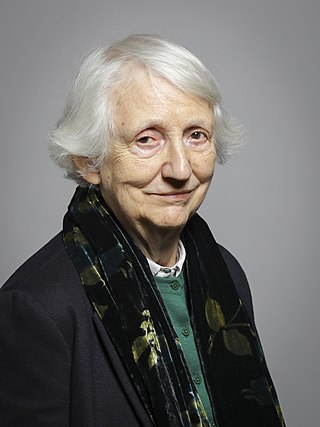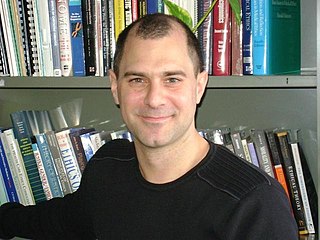Related Research Articles
Bioethics is both a field of study and professional practice, interested in ethical issues related to health, including those emerging from advances in biology, medicine, and technologies. It proposes the discussion about moral discernment in society and it is often related to medical policy and practice, but also to broader questions as environment, well-being and public health. Bioethics is concerned with the ethical questions that arise in the relationships among life sciences, biotechnology, medicine, politics, law, theology and philosophy. It includes the study of values relating to primary care, other branches of medicine, ethical education in science, animal, and environmental ethics, and public health.

Onora Sylvia O'Neill, Baroness O'Neill of Bengarve, is a British philosopher and a crossbench member of the House of Lords.
Jean Paulette Bethke Elshtain (1941–2013) was an American ethicist, political philosopher, and public intellectual. She was the Laura Spelman Rockefeller Professor of Social and Political Ethics in the University of Chicago Divinity School with a joint appointment in the department of political science.

Bartha Maria Knoppers, OC OQ is a Canadian law Professor and an expert on the ethical aspects of genetics, genomics and biotechnology.
Janet Elizabeth Smith is an American classicist and philosopher, and former professor of moral theology at the Sacred Heart Major Seminary in Detroit, Michigan.

Anthony Colin FisherOP is an Australian prelate of the Catholic Church and a friar of the Order of Preachers (Dominicans). Since 12 November 2014, he has been the ninth Catholic Archbishop of Sydney. He served as the third Bishop of Parramatta from 4 March 2010 to 12 November 2014, having previously served as an auxiliary bishop of the Archdiocese of Sydney.

Arthur Schafer is a Canadian ethicist specializing in bioethics, philosophy of law, social philosophy and political philosophy. He is Director of the Centre for Professional and Applied Ethics, at the University of Manitoba. He is also a full professor in the Department of Philosophy and an ethics consultant for the Department of Paediatrics and Child Health at the Health Sciences Centre in Winnipeg. For ten years he was head of the Section of Bio-Medical Ethics in the Faculty of Medicine of the University of Manitoba. He has also served as visiting scholar at Green College, Oxford.
Margaret A. Farley is an American religious sister and a member of the Catholic Sisters of Mercy. She was Gilbert L. Stark Professor Emerita of Christian Ethics at Yale University Divinity School, where she taught Christian ethics from 1971 to 2007. Farley is the first woman appointed to serve full-time on the Yale School board, along with Henri Nouwen as its first Catholic faculty members. She is a past president of Catholic Theological Society of America.
The Centre for Human Bioethics is the previous name of a research and teaching centre at Monash University, based in the Faculty of Arts. The Centre is now known as the Monash Bioethics Centre. It focusses on the branch of ethics known as bioethics, a field relating to biological science and medicine. It was founded in October 1980 by Professors Peter Singer and Helga Kuhse, as the first centre in Australia devoted to bioethics, and one of the first in the world.

Daniel Isaac Wikler is an American public health educator, philosopher, and medical ethicist. He is currently the Mary B. Saltonstall Professor of Population Ethics and Professor of Ethics and Population Health in the Department of Global Health and Population of the Harvard T.H. Chan School of Public Health in Boston. He is Director and a core faculty member in the Harvard Program in Ethics and Health (PEH). His current research interests are ethical issues in population and international health, including the allocation of health resources, health research involving human subjects, organ transplant ethics, and ethical dilemmas arising in public health practice, and he teaches several courses each year. He is a fellow of the Hastings Center, an independent bioethics research institution.

Anita LaFrance Allen is the Henry R. Silverman Professor of Law and professor of philosophy at the University of Pennsylvania Law School. She was formerly Vice Provost for Faculty from 2013 to 2020.
Hilde Lindemann is an American philosophy professor and bioethicist and emerita professor at Michigan State University. Lindemann earned her B.A. in German language and literature in 1969 at the University of Georgia. Lindemann also earned her M.A. in theatre history and dramatic literature, in 1972, at the University of Georgia. Lindemann began her career as a copyeditor for several universities. She then moved on to a job at the Hastings Center in New York City, an institute focused on bioethics research, and co-authored book The Patient in the Family, with James Lindemann Nelson, before deciding to earn a Ph.D. in philosophy at Fordham University in 2000. Previously, she taught at the University of Tennessee and Vassar College and served as the associate editor of the Hastings Center Report (1990–95). Lindemann usually teaches courses on feminist philosophy, identity and agency, naturalized bioethics, and narrative approaches to bioethics at Michigan State University.
Claudia Wiesemann is a German medical ethicist and medical historian. She is full professor and head of the Department of Medical Ethics and History of Medicine at Göttingen University Medical Center. Being a member of the German Ethics Council since 2012, she was elected Deputy Chair in 2016.

Bryn Williams-Jones is a Canadian bioethicist, professor and director of the Department of Social and Preventive Medicine at the School of Public Health, Université de Montréal. He is co-founder and editor-in-chief of the Canadian Journal of Bioethics/Revue canadienne de bioéthique, the first open access bilingual bioethics journal in Canada, and co-director of the Ethics branch of the International Observatory on the Social Impact of AI and Digital Technology (OBVIA). Williams-Jones is a member of the Centre for Research in Public Health (CReSP), the Centre for Ethics Research (CRÉ), the Institute for Applied Ethics (IDÉA) of the Université Laval, and fellow of The Hastings Center.
Susan Sherwin is a Canadian philosopher. Her pioneering work has shaped feminist theory, ethics and bioethics, and she is considered one of the world's foremost feminist ethicists.
Teresa Godwin Phelps is an American author and professor of law. She taught at the University of Notre Dame Law School from 1980 until 2006. She also taught at American University's Washington College of Law where she was the Director of the Legal Rhetoric Program from 2006 until she retired in 2019. Phelps is the author of several books and over 30 articles.
Gilbert Meilaender is a prominent American Lutheran bioethicist and theologian. He is Senior Research Professor of Theology at Valparaiso University, and served on the President's Council on Bioethics from its founding in 2002 until its dissolution in 2009.
Bernadette Tobin is an Australian Catholic ethicist and professor of philosophy. She is the daughter of political activist and journalist B.A. Santamaria.
Rebecca S. Dresser is an American legal scholar and medical ethicist.
References
- "Professor Somerville discusses the ethics of medical breakthroughs". Australian Broadcasting Corporation. 28 May 2007. Retrieved 28 May 2007.
- "Margaret A. Somerville". McGill University . Archived from the original on 13 June 2006. Retrieved 15 June 2006.
- "Canadian Who's Who 1997 entry". University of Toronto Press . Retrieved 15 June 2006.
- "The Case Against Same-Sex Marriage: A Brief Submitted to the Standing Committee on Justice and Human Rights" (PDF). Retrieved 29 April 2003.
- "Faculty protests award for Montreal ethicist". CTV News . Archived from the original on 15 March 2007. Retrieved 19 June 2006.
- "Spineless and rude – Ryerson University shows how not to award an honorary degree". National Post . Archived from the original on 13 July 2006. Retrieved 19 June 2006.